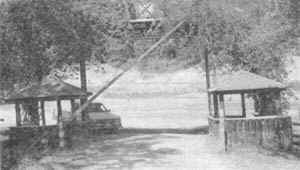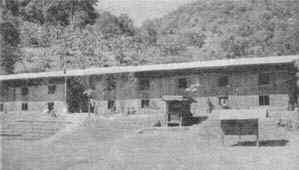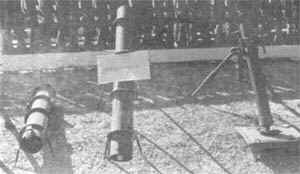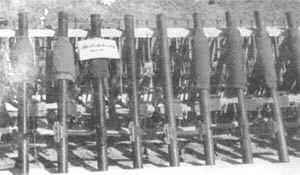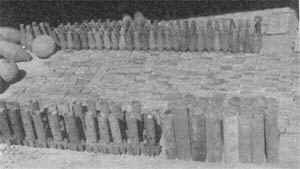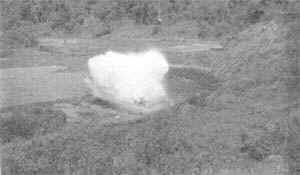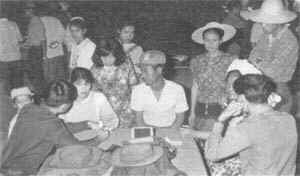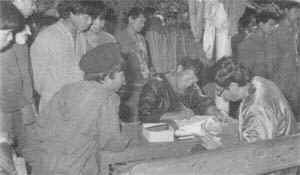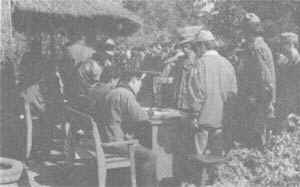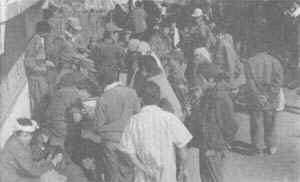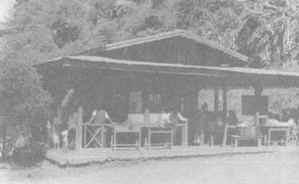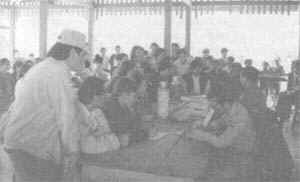|
Why Did U Khun Sa’s MTA Exchange Arms for Peace |
||||||||
|
Part V The other day our conversation ended rather abruptly so I did not have the chance to ask my friend to elaborate on his assertion that while preparations for the surrender were underway, MTA troops had also suffered fatalities and casualties just as Government troops had done. When I met my friend today I raised this question at the opportune moment. In reply he showed me a rough hand-sketched map and referring to this he explained the situation of the time. He showed me the location of their MTA units and the ‘Wa’ position and the path through which Government Forces had entered. The intelligence delegation had arrived at Ho Mong Headquarters on 30th December 1995, and held discussions and coordinated plans on how to bring in and station Government troops at strategic positions occupied by the MTA, and how to reassemble them. On the other hand arrangements also had to be made to gather together their men and weapons to be ready for the surrender. When the discussions had been finalized, a member of the intelligence delegation left and troops of No.55 Brigade under Col. Moe Hein posted on the west bank of the Thanlwin river were withdrawn. The Government Forces first entered Ho Mong and its vicinity only then. But almost simultaneously, the intelligence delegation together with units of the Regional Military Command Headquarters in Kyaingtong headed by Colonel Pyi Sone entered and occupied the Lwe Lan/ Lwe Ton region. In the second week of January, when the surrender at Lwe Lan and Ho Mong had just taken place, the intelligence delegation and troops under the command of Colonel Thiha Thura, Thura Sitt Maung entered the Mone Tawt / Mone Hta region. And then made arrangements for the surrender of the rest of the MTA members. That was what my friend recounted to me.
“My friend, did the MTA members assemble and surrender as soon as the Government Forces entered your territory?” “Wait! Let me tell you stage by stage. Our leaders had held discussions with your intelligence delegation, but our troops at the time were not grouped together in one place, how could they be? They were posted in different strategic points to guard the headquarters. These troops had to be recalled to headquarters and this couldn’t be done all at the same time. They had to be recalled in small staggered groups. And when your troops arrived they took up their positions in the vacated places. Arrangements for surrender began only when all columns of the Government Forces were in place. To tell you the truth if some MTA members had disobeyed orders then and decided to attack, we would have been in a really tight spot.” “Oh! Was that how it was? You know I was wondering why such large numbers of Government troops were brought in when surrender had already been agreed to. What you’ve just said clears up this point.” “When agreement had been reached after consultations and discussions at Ho Mong, and army columns had been placed in the Lwe Lan region, we tried to initiate the first surrender on 4th January, you know as an Independence Day gift. ” “As far as I know, didn’t you start handing over your arms on 5th January, 1996?” “Yes, that’s right. And if it had not gone smoothly at Ho Mong which was the headquarters, it would have infected the other areas and all arrangements would have gone wrong. The momentum of the take off would have been broken. Then, the ‘Wa’ forces were still attacking the MTA up until the last minute. So even assembling our troops for the surrender was difficult and involved a lot of effort. That’s why we couldn’t make it in time for Independence Day. The ceremony for the first surrender at Lwe Lan could only be held on 5th January. At Ho Mong too, so many arrangements had to be made really watertight that the first surrender could take place only on 7th January.” “Up to the time when all arms had been surrendered, did fighting break out any where by dissident factions?” “As I told you, some were agreeable to the surrender and some were rather resentful, but fighting did not erupt anywhere. Not a shot was fired. But in the Mone Tawt / Mone Hla region, Ywet Hsit and about 200 men absconded to the west bank of the Than Lwin river after the surrender even though Ywet Hsit himself had participated in the ceremony.”
The “Ye Nyunt” Boys being escorted home after the surrender ceremony. “Oh!, Is that the group that is now known as the SURA Ywet Hsit group? The one that is terrorizing the people and killing indiscriminately.” “That’s the one. The real story behind it is that he had misappropriated the proceeds from smuggling timber to Thailand. He absconded because he couldn’t account for the missing cash. Now he is producing and trafficking in heroin as well as stimulant drugs. He established contact with the old SURA group in Mae Hong Song and with Khun Kya Nu’s group, which is a western bloc parasite group located in the country across our borders. Under cover of the Shan national cause, these people are trying to create havoc and terror in the countryside. This guy Ywet Sit is lucky in a way. Government Forces already had information that he was about to make a run. But to avoid misunderstanding and confusion, attempts were made to deal with the situation as delicately as possible. We didn’t want a shot to be heard during that crucial period and also wished to avoid issuing orders to shoot. “ “Were there any other problems? “ “No, except for the fact that leaders of the Shan nationals of the MTA tried to see the leader of the delegation at the time of his arrival and made several later attempts because they wished to negotiate a peace agreement rather than a surrender. That was just before the actual surrender took place. I was a member of that group too.” “Did you get to meet him? “
The Munitions workshop at Ho Mong. “No we didn’t. At first, we didn’t want to accept surrender as part of the terms. But looking at it from the Government’s point of view, the MTA had this big black mark of drug traff1cking against it. We came to realize there was no way we could negotiate peace terms as a former armed national group. Our MTA was also an organization of many disparate factions. So even if we had been able to reach a peace agreement on the same terms as the others, we would not have been able to Stand together and function as a national group. The main thing was time and conditions were not ripe either. It was also time for our people and country to have some peace. That was why, although I was not in favour of surrender, I put my personal feelings aside and with good will co-operated to bring about the surrender.” “Well I must say I admire you for that.” “Don’t admire me my friend. If you want to shower praise on anyone, U Khun Sa and U Kyan Hsu Shin deserve the praise more than I do.” “You’re not praising them because they’re your leaders, are you?” “That isn’t why I’ve told you time and again, that I don’t really see eye to eye with them. I hardly approve of their racial outlook or ideology. But I cannot but admire U Khun Sa’s courage and determ1natlon in deciding to surrender and U Kyan Hsu Shin who so systematically and meticulously organized the successful implementation of this surrender. And that is because I am fully aware of their real wishes and desires. Believe you me! “ “I believe you, I do realize that you’re giving me a fair and objective appraisal”
The Munitions workshop at Lwe Lan. “Leaving aside other matters, when the Government Forces arrived in Ho Mong, U Khun Sa was as concerned about the welfare of your people as of his own men. He saw to their needs and food and supplies. Since it was winter and the weather extremely cold, especially for the soldiers stationed on high ground, he issued blankets as well as other necessities within his means. Your army units know this very well.” “There is fellowship among soldiers so they generally have consideration and sympathy for each other.” “Moreover, he had this sense of national pride, you know ‘This is my land, my country’, sort of attitude. You see we have MTA outposts on the border. But in that area, boundary demarcations are none too clear, and at times military patrols of the other country would threaten us to make us retreat further inland. At some points they tried to push forward to expand their territory. He never yielded an inch. He had even made preparations in case of external aggression. He built defensive fortifications along possible approach routes and had a reserve of anti-tank mines. The day after your intelligence delegation arrived he escorted them to the border to show them what he had done and the steps the Government Forces should take if and when necessary.”
“Yes I agree, he must have had a sense of national pride.” “Moreover, he didn’t want any difficulties to mar his surrender plans. To put it another way, he didn’t want a drop of blood to be shed on either side. Thinking along those lines, he began to see that the most volatile place in any attempt to sabotage the surrender was the arms and ammunition factory.” “Ha! Do you mean to say you people had a munitions factory? What kind of weapons did it produce?” “To say it is a factory would be an exaggeration although that’s how we referred to it. It’s, let’s say, more of a workshop. It was located in a valley about a mile wide between the mountains. It had lathes and furnaces for smelting iron and a large supply of gunpowder. There were over 200 MTA workers capable of producing about 2,000 land mines and over 2000 hand grenades. They also produced launchers and rockets and other small military equipment. We employed our own methods of manufacture but the quality was not bad. The TNT powder stored in that workshop was not less than 40/50 tons and there were a lot of completed and half-completed mines, bombs and fuses. So that was the flash point. If any malcontent had done some mischief, there would have been real trouble. U Khun Sa had the foresight to take all this into consideration. Accordingly, as soon as the intelligence delegation arrived they were shown the workshop. He also tied up arrangements for Government Forces to secure the place on arrival at Ho Mong. We were indeed fortunate. There was no mishap whatsoever. After handing over the factory to the Armed Forces, I believe, it took two months to destroy the arsenal of bombs and dynamite in that place.” “What you’ve just said has made me realize the high risk factor that was present. Just one or two or a small group of malcontents could have destroyed or seized the workshop and used if for their own ulterior motives. It could have caused a lot of bloodshed. It must have been a highly dangerous situation, wasn’t it? “
Hand grenades producted by the MTA munitions works at Ho Mong. “Undoubtedly. That’s why U Khun Sa made the necessary preliminary arrangements. But our MTA members were also acquiescent and created no problems. Some of those employed at the workshop are educated young men with degrees and diplomas in engineering from the Yangon Institute of Technology and the Government Technical Institute. They were good enough to help the army technicians. Think about it, these young people had worked with devotion to craft and create these weapons and the necessary parts. But once these munitions were transferred to the Government Armed Forces, the latter couldn’t possibly have utilized them or hoarded them. The only way out was to destroy them because they posed a danger. The whole lot was destroyed before the very eyes of those who had a part in their manufacture. Think about that!” “I agree the MTA men too deserve praise.”
“Wait, wait a bit before you go overboard with your praises. There’s something I must fill you in from our conversation the other day. I told you that in the surrender of arms in the Lwe Lan region some soldiers of the Govermnent Forces as well as some of ours were killed and wounded.” “Yes you did, so let’s hear about it.” “A Government military intelligence unit and infantry troops under the command of Colonel Pyi Sone entered this Lwe Lan region round about 29th or 30th December, 1995. As I told you it was a time when intense battles were raging with the ‘Wa’ force in the Lwe Lan / Lwe Tong region. So contact had to be made before entering, and messages conveyed to the ‘Wa’ to stop the shooting. In some places Govenment army units had already occupied MTA positions which were in direct confrontation with the ‘ Wa ‘. In other areas, the army was still on its way. There was also a small defensive MTA outpost of about 30 men at ‘ Lwe – Ma – Oh ” in the Mong Yung area. The ‘ Wa ‘ troops were attacking this small outpost on all sides and by 1st January it was already encircled and besieged. At that point the Deputy Commander of the MTA brigade decided to rescue his people and withdrew men from the rear post to launch a counter attack”
“I suppose it’s natural to go to the rescue of one’s men.” “But if he had embarked on this plan to attack, there would have been confusion triple-fold, with the Armed Forces, the MTA and the ‘ WA each intent on its own objectives. In many places contacts had been made successfully and firing had more or less ceased to a certain extent. Even the ‘Wa’ had halted the fighting except in this one place. Wireless communication between the ‘Wa’ and the army units had broken down at this point. If the ‘Wa’ had continued to fight with the MTA on the verge of counterattack, all our well-laid plans would have fallen through. So the Government Forces had to contact the ‘Wa’ by hook or by crook on the one hand, and on the other, assure the MTA that it would protect the MTA position at all cost. In the end the MTA agreed not to launch a counter attack. But in the meanwhile this small outpost with 22 MTA members was over run. Some were killed and some were captured. They said about 5 or 6 of those captured were later released. Put yourself in their place and tell me how you would feel. These MTA members had to really grit their teeth and bear it for the sake of the many. That was the sacrifice in life and blood. U Khun Sa was very upset when he heard this and his blood pressure shot up.” “Hmm, that’s really tragic.” “Anyway on the evening of 3rd January, military intelligence units managed to contact the ‘Wa’ group and explain to them that the MTA was preparing to surrender and that Government army units would be taking up the positions vacated by the former. The ‘Wa’ were then asked to cease their attacks. It was fortunate the ‘Wa’ understood the explanation. The situation then calmed down and was stabilized.”
Surrendered MTA members receive temporary National Registration Cards and cash at Lwe Lan. “That was lucky, otherwise there would have been confusion confounded.” “Our Ho Mong Headquarters had planned from the outset to begin the surrender ceremony at Lwe Lan. It was vital for arrangements to go according to plan, and ar first, 4th january was the date set for the ceremony to make it a memorable occasion. But fighting stopped late at night on the 3rd. So What with all the arrangemants that had to be made, the surrender ceremony couldn’t be held on the 4th.” “Why wasn’t the first surrender ceremony held at the Headquarters?” “I suppose from the civilian point of view the surrender ceremony should have started at the Headquarters of the group. But if something had gone amiss at Headquarters it would have been hard to control the situation. Moreover it was logical to start from the most difficult place with the largest concentration of forces. And since it went through smoothly there, it was plain sailing at the remaining places.” “Oh! Yes I see. I suppose I was thinking like a civilian again.”
Temporary National Registration Cards and welfare funds being issued in the Mong Htaw/Mong Hta region. “The MTA surrendered its arms for the first time on 5th January. MTA brigade commanders Twan Ko Chin, Kyauk Hsit Hla Maung, Pin Haw and Thein Shwe handed over men and arms to Colonel Pyi Sone. Then surrenders again took place, once on 9 January and another on 16 January. There was a total of 2522 men and 2115 assorted weapons.” “I heard that surrendered MTA members came back towards Monghsat iovously as if they were going to a pagoda festival.” “As soon as the arms had been surrendered these people were furnished with temporary National Registration Cards and necessary welfare funds. MTA members headed for home as soon as they had handed over their arms. They didn’t stop. Not even for a moment. The elderly people and the women and children were transported by helicopters to Monghsat. Every body was in a rush to get home – happy and glad.” “Well, naturally they wanted to head for home.” “Right, Do you see the significance of that? They made no protest against the surrender of their arms, they did not create a furore. Nor did they show any signs of regret. Do you realize why they were so excited and happy to be going home? They had really become weary and had started to hate the fighting and the warring. It showed that what they hungered for most was peace.” |
